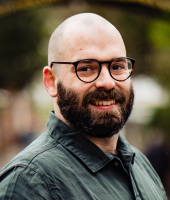Tom Vaughan
Tom Vaughan is a Lecturer in Strategy and Intelligence in the Department of International Politics, Aberystwyth, UK, and the Principal Investigator of the TCND project. He publishes on the politics entailed in imagining and discounting different visions of the (post-) nuclear future, and on the politics of nuclear technology in the continent of Africa.
He joins the Paris IAS in October 2024 for a group research stay as part of the CAT collaborative program, working with researchers Lyndon Burford, Kjølv Egeland, Heba Taha, and Jana Wattenberg.

Research Interests
The politics of imagining nuclear futures, the politics of nuclear technology in the continent of Africa
Theories of Change and Nuclear Disarmament
(Collaborative project, awarded a NetIAS Constructive Advanced Thinking grant, 2021-2024)
Key Publications
Vaughan, Tom (2024) 'Post-nuclear worldmaking and counter-hegemony: Against catastrophic failures of imagination'. European Journal of International Security, first view, pp. 1-20. https://doi.org/10.1017/eis.2024.4
Pretorius, Joelien and Vaughan, Tom (2024) 'Complexity, depoliticisation, and African nuclear ordering agency: a meso-level exploration'. Cambridge Review of International affairs, first view, pp. 1-20. https://doi.org/10.1080/09557571.2024.2356729
Pelopidas, Benoit, Taha, Hebatalla, and Vaughan, Tom (2024) 'How dawn turned into dusk: Scoping and closing possible nuclear futures after the Cold War'. Journal of Strategic Studies, first view, pp. 1-12. https://doi.org/10.1080/01402390.2023.2290441
|
|
|
|
|
|
